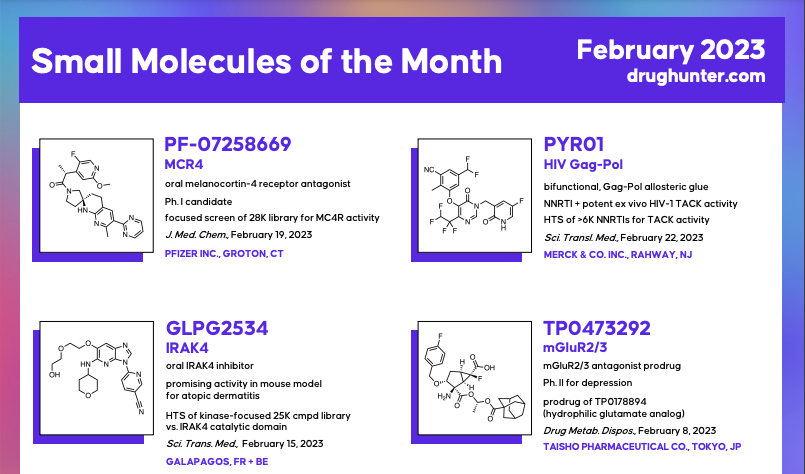This month features big announcements from Biogen on their acquisition of Reata and their Nrf2 activator for Friedreich’s ataxia and from BridgeBio on their TTR stabilizer with positive Ph. III data for their ATTR-CM treatment. A pair of KRAS inhibitors from Chugai (macrocycle) and AstraZeneca (brain-penetrant) also makes the list for their notable pharmacology. Other notable molecules from July include Aelis Farma’s Ph. IIb CB1 inhibitor, Boehringer Ingelheim’s Ph. II/III MDM2 PPI, and Janssen’s Ph. II P2X7R inhibitor.
We’ll have more detailed case studies on these molecules coming soon, but in the meantime you can check out some recent articles about the following here:
omaveloxolone - oral Nrf2 activator approved to treat Friedreich's ataxia from modification of oleanoic acid (developed by Reata and acquired by Biogen).
LUNA18 - oral KRAS inhibitor in Ph. I dose-escalation for metastatic solid tumors from mRNA display library hit by Chugai.
AZD4747 - brain-penetrant KRASG12C inhibitor lead intended for KRASG12C-positive tumors from structure-based drug design by AstraZeneca.
AEF0117 - Signaling-specific CB1 inhibitor Ph. IIb for cannabis use disorder from rational design of pregnenolone derivatives by Aelis Farma.
brigimadlin (BI 907828) - oral MDM2–p53 PPI inhibitor in Ph. II/III for DDLPS designed from prior spirooxindoles by Boehringer Ingelheim.
JNJ-54175446 - oral P2X7R antagonist Ph. II for major depressive disorder from prior P2X7R CNS penetrating leads by Janssen.
arazasetron (SENS-401) - oral H4R + 5-HT3 antagonist with positive results in Ph. IIa for sudden sensorineural hearing loss besylated form of (R)-azasetron by Sensorion.
JT001 - oral NLRP3 inflammasome inhibitor oral efficacy in models; related to Ph. I candidate GDC-2394 from MCC950 and opt. for lipophilic ligand efficacy, developed by Jecure and progressed by Genentech.
acoramidis - oral TTR stabilizer efficacy in Ph. III in ATTR-CM hit from HTS for TTR ligands + opt by BridgeBio.
KCL-286 - oral RARβ agonist efficacy data in Ph. I for spinal cord injury ligand-based virtual screen + opt from King’s College London.
